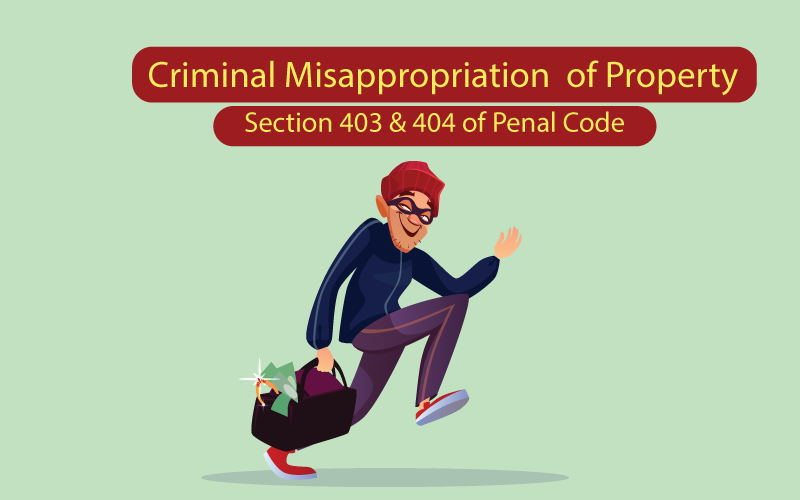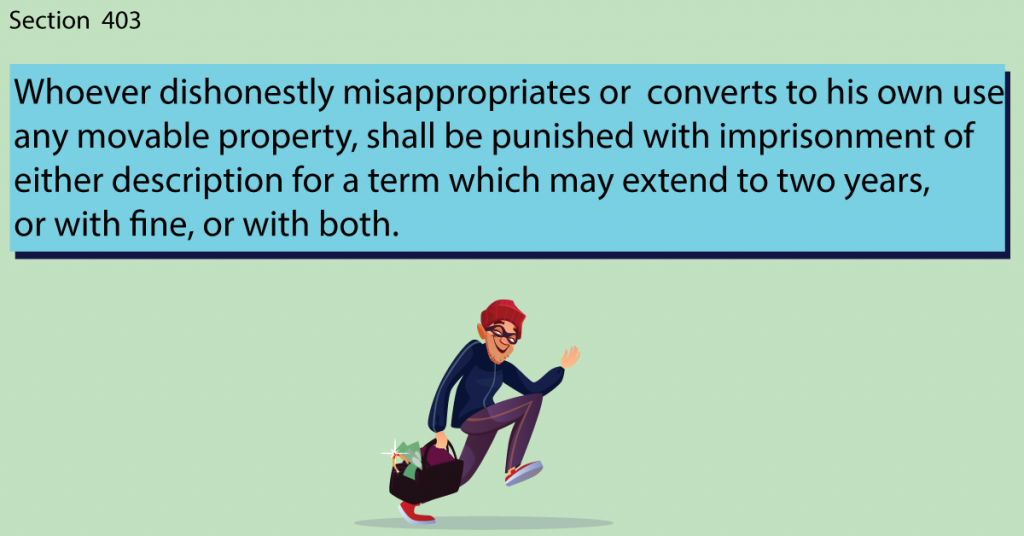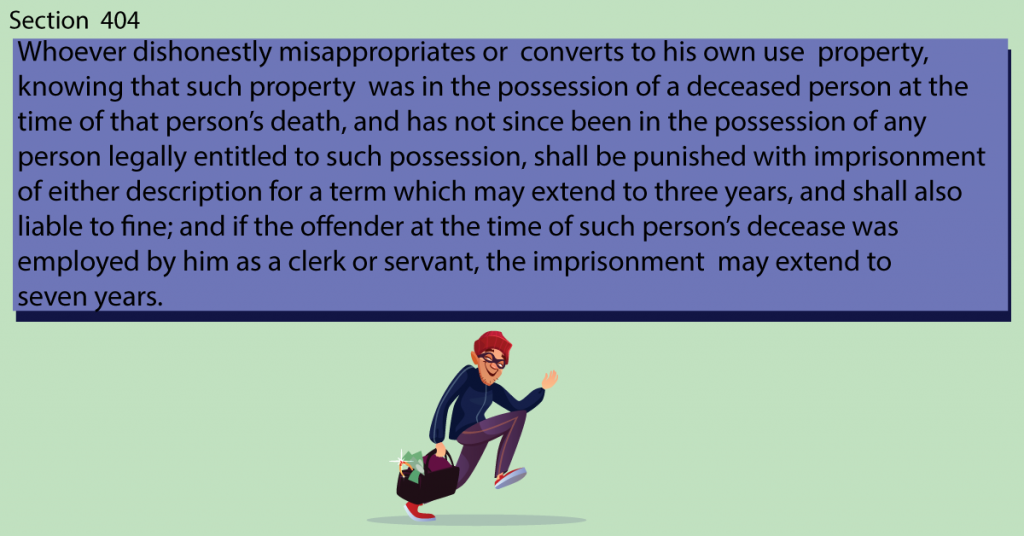Introduction
Section 403 and Section 404 of Indian Penal Code talks about criminal misappropriation of property. These two sections are discussed in chapter XVII of Indian Penal Code which is offences against property. In section 403, it talks about dishonest misappropriation of property and Section 404 talks about dishonest misappropriation of property possessed by deceased person at the time of his death.
Dishonest Misappropriation of Property Section 403 of IPC
Section 403 says,
There are three most important elements in this section.
- Dishonest Intention
- Movable Property
- Converts to own use
Dishonest Intention
There must be a dishonest intention.
For example, if A found a ring in road with the intention to return it to the owner then it won’t be considered as criminal misappropriation of property. On the other hand, if he knew the owner of the ring and didn’t return it with a bad intention then it will be constituted as misappropriation. But if A did not know nothing about B’s information and followed all the procedures to return it to B. If he failed to return it after all these steps taken, then he can take the ring. It won’t be considered as criminal misappropriation of property.
Two important points regarding dishonest intention are:
1.It is not necessary that dishonest intention should be there in the first place. If the intention was pure while taking something but later it becomes a dishonest intention, it will still be considered as dishonest misappropriation of property.
For example, A went to B’s house. Both A and B have same watch. By mistake A took B’s watch. After some time, A realized that the watch is not his rather B’s but he did not return the watch.
Here at first place, A took the watch by mistake. It won’t be constituted as dishonest misappropriation but his later act will be constituted as dishonest misappropriation.
2.Dishonest Intention can be for a time being also.
For example, A found a ring in a road and knew that the owner of the ring is B. He thought that he will return the ring later and he went to bank and took loan by depositing the ring. It will be constituted as dishonest intention as the dishonest intention was there for a time being.
There must be Movable Property
To constitute as criminal misappropriation of property, there must be movable property. This section only applies to movable property.
Converts To Own Use
If someone converts any movable property as if it is his own then it will be fall under this section.
For example, if A finds a mobile in a road and then he sells it or pawns it as if it is his own then it will fall under this section.
Case Laws Regarding This Section
R V Sita
In this case, the accused found jewelry on the road and sold the jewelry. Here the owner was not traceable. The court said this won’t fall under criminal misappropriation of property.
Phuman (1907)
In this case, the accused found a purse in a temple and put it under his pocket. He was arrested immediately. Court held that he was not guilty of it as it could not be assumed that whether he took it for his own use or not.
Ram Dayal (1886)
In this case, a girl found a gold necklet. Her brother told her that this necklet belonged to a man of his acquaintance and took the necklet. Later, it was found that it was not true and he took the necklet under his possession. Court held that he was guilty under this section 403 of IPC.
Punishment Under Section 403 of IPC
According to section 403 of IPC, punishment can be up to two years of imprisonment or with fine or with both. This offence is
- Non-cognizable
- Bailable
- Any magistrate can trial this case
- Compoundable
Section 404 of IPC
Section 404 says,
Object of this section is to protect the property of the person dying.
Important Note: Property mentioned in this section is movable property. It can’t be immovable property. In the case Giridhar Dharamadas (1869), a person was convicted of misappropriating the house of a deceased person.the Bombay High Court said that, property in this section refers to only movable property. Thus, the conviction was rejected.
Punishment under Section 404 of IPC
In normal, the punishment can go up to three years of imprisonment or with fine or both. If the offender was the deceased servant or clerk, then the punishment can go up to seven years.
This offence is
- Non-cognizable
- Bailable
- Magistrate of First class can trial this case
- Non-compoundable
Difference between Theft and Criminal Misappropriation of Property
- Provision: Theft is discussed under Section 378 of IPC, where criminal misappropriation of property is discussed under Section 403 of IPC and Section 404 of IPC.
- Intention: In theft, dishonest intention (mens rea) is there in the first place. On the other hand, dishonest intention can be anytime in criminal misappropriation of property.
- Offense: In theft, the offense takes place as soon as a person takes something with dishonest intention. But in criminal misappropriation of property, an offense can happen by a subsequent change of intention or some fact which the person did not know in the first place.
- Consent: In theft, there is no consent. But in criminal misappropriation, consent may be or may not be there. For example, a person gives his bike to a servicing center to clean or repair his bike. If anyone from that center, gives the bike to another person for rent thinking that later he will return the bike to the owner. In this scenario, it will come under section 403 of IPC. Here the owner gives his bike to the servicing center with consent. That’s why consent may or may not be here.
Difference Between Indian Law and English Law
There is a major difference regarding Section 403 of Indian Penal Code and English law. In India, dishonest intention can be there at any time whether first place or sub-sequent will constitute as criminal misappropriation of property but in English law, sub-sequent dishonest intention won’t be criminal misappropriation. According to English law, it is a matter of civil case not criminal case. But in our law, both at the time and sub-sequent dishonest will fall under Section 403.
These were all about Criminal misappropriation of property that is Section 403 and section 404 of IPC. You can check out our other penal code related articles. Click here to read those articles.
- What is Mens Rea and Actus Reus - February 13, 2024
- Case Summary of Anglo Norwegian Fisheries Case | United Kingdom V Norway - April 7, 2023
- What is a Solicitor? How to Become One - January 9, 2023



